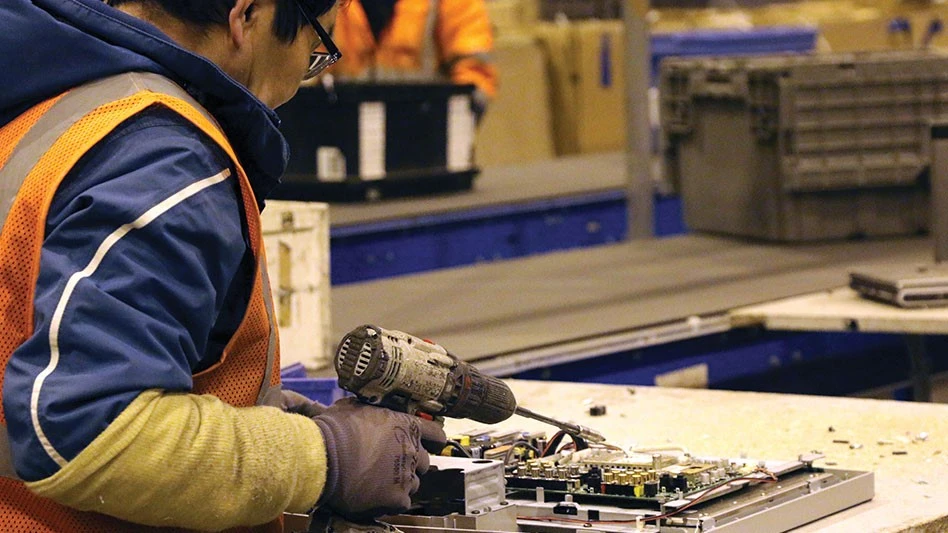
Photo courtesy of Sunnking
In June, New York lawmakers approved the Digital Fair Repair Act, which expands consumer access to parts, tools and information to repair personal electronics. The Digital Fair Repair Act has not yet been signed into law by New York Gov. Kathy Hochul. While the bill is expected to benefit consumers, experts believe it also would create an economic boom in the information technology asset disposition (ITAD) industry.
As previously reported, the bill would require original equipment manufacturers (OEMs) to make diagnostic information, spare parts, schematics, special tools and firmware available to independent repair providers, says Nathan Proctor, the senior right-to-repair campaign director for the United States Public Interest Research Group (PIRG).
The bill would require OEMs to provide information and tools to fix devices with microprocessors, such as computers, phones and tablets. However, agricultural equipment, public service equipment and home appliances are not covered in the legislation.
“There's a whole set of things that this is going to make easier for ITAD companies, refurbishers and resellers,” Proctor says. “It's going to make it easier for companies to fix equipment that they have, and it makes it easier to salvage parts from broken electronics and use it in other electronics.”
Potential benefits
Previously, OEMs heavily restricted what companies could access blueprints and manuals for their equipment. The bill would increase access to firmware and information required to clean, repair and reset IT equipment. This could lead to an increase in the quality of repairs ITAD companies will be able to make.
It also could make processing electronics faster as companies will have better tools and parts, says Adam Shine, president of Sunnking, an ITAD company based in Brockport, New York. Sunnking primarily processes equipment for education and health care and retail.
"This would certainly make it easier to identify the various models of electronics that are out there, where those parts are and how they connect,” Shine says. “So having access to those OEM parts will end up leading to a lot of material being able to be reused and not recycled for commodity value.”
Shine and Gay Gordon-Byrne, the executive director of the Digital Right to Repair Coalition, say that the bill would increase business opportunities and increase the value of the equipment. ITAD companies could begin offering third-party support and more services to maintain and repair devices, instead of refurbishing and selling them, because of the increased access.
“We can sell [small businesses] electronics and, when they fail, we could then be able to service them because we have access to those OEM parts,” Shine says.
The bill could allow businesses to explore new ways to sell products to their customers. For Jill Broikos, the vice president of asset recovery for VarData, an electronics refurbisher based in Rochester, New York, the bill could allow companies to sell spare parts directly to customers.
As a result of these new business opportunities, increases in quality and decreases in processing times, Gordon-Byrne and Proctor say companies would be able to expand their operations.
Gordon-Byrne estimates the workforce will grow by 14 percent based on a study her association conducted that surveyed ITAD companies across the country.
Potential risks
While Proctor, Gordon-Byrne and Shine are optimistic about the bill’s effect on ITAD service providers, it is still unclear how it will impact the ITAD industry.
To Shine, whose company processes 25 million pounds of electronics annually, the life cycles of equipment would increase considerably, which could decrease what devices ITAD companies could process, He says this could be offset by the constantly growing number of electronics on the market.
Broikos, whose company processes 1.5 million pounds of electronics annually, says she believes this bill could adversely affect smaller businesses that primarily focus on one or two types of electronics, such as cellphones and personal laptops.
“It's going to impact the mom-and-pop repair stores a little bit more,” she says. “The businesses that exist to repair certain devices may lose business if everyone has access to the same information.
“However, larger businesses won’t be too impacted,” she adds.
Another possible issue companies could face down the line is supply chain constraints. Because the bill increases access to quality parts, a tighter strain will be placed on manufacturers that supply those parts. This could create high prices as supply chains struggle to meet demand.
While Shine sees a potential downside for the bill, he says he believes this would take time and any impact, good or bad, wouldn’t be immediate. Shine also is skeptical about how OEMs will roll out the parts and information they would be required to supply.
“There could be long lead times [to get the information], and I think it also remains to be seen exactly how the manufacturers allow access,” he says. “Are they going to have dedicated websites for ordering cards and getting access to the manuals? Do you have to have an agreement with the manufacturer to have access to the site? That's all stuff that remains to be seen.”
Despite this, Shine says he believes the bill would be a step in the right direction for the state, saying the best form of recycling is to be able to reuse something for its intended purpose.
Latest from Recycling Today
- BMW Group, Encory launch 'direct recycling’ of batteries
- Loom Carbon, RTI International partner to scale textile recycling technology
- Goodwill Industries of West Michigan, American Glass Mosaics partner to divert glass from landfill
- CARI forms federal advocacy partnership
- Monthly packaging papers shipments down in November
- STEEL Act aims to enhance trade enforcement to prevent dumping of steel in the US
- San Francisco schools introduce compostable lunch trays
- Aduro graduates from Shell GameChanger program





